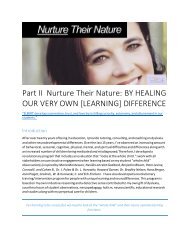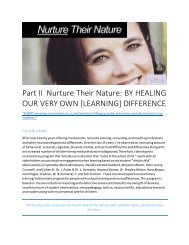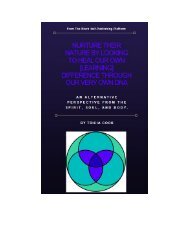- Page 2 and 3: Nurture Their Nature Preface Belove
- Page 4 and 5: Tricia Cook, MEd., RSP, AOG; https:
- Page 8 and 9: Nature
- Page 10 and 11: In the field of child -psychology,
- Page 12 and 13: appears sadly depressed (hypo activ
- Page 14 and 15: Mind you again, learning with meani
- Page 16 and 17: 2.1 HPA illustration Vagus Nerve an
- Page 18 and 19: Vagus Nerve & RAS Vibrating Alta Ma
- Page 20 and 21: ● RAS= HPA & ACC (body & brain= b
- Page 22 and 23: quantum-self; there are three forms
- Page 24 and 25: Concrete Thought (conscious develop
- Page 26 and 27: “Now all glory to God, who is abl
- Page 28 and 29: themselves along with soul -body di
- Page 30 and 31: Note: The Earth Star and Gaila Gate
- Page 32 and 33: elationship memories appear to be s
- Page 34 and 35: Thalamus- integrates and sends sens
- Page 36 and 37: *NOTE: Dysregulated and Dysfunction
- Page 38 and 39: The pons integrates both the medull
- Page 40 and 41: Thymus image 4.2 thymus illustratio
- Page 44 and 45: Approximately, how many neurodivere
- Page 46 and 47: Have you noticed a change in his/he
- Page 48 and 49: In-text: (“What is Epigenetics? T
- Page 50 and 51: ● ● ● ● ● ● ● ● Art
- Page 52 and 53: Results: Acute Initial Response to
- Page 54 and 55: Need attunement *can be varie d inc
- Page 56 and 57: Thymus (12 chakra and all chakras,
- Page 58 and 59: Cook’s Alternatives and Suggestio
- Page 60 and 61: toxic infused environment- bioelect
- Page 62 and 63: Response: Better with short-term me
- Page 64 and 65: as well from “doing” by experie
- Page 66 and 67: Work Primarily PYAM Daily: ● Pray
- Page 68 and 69: courage/compassion bliss/harmony gr
- Page 70 and 71: We pray that God himself, the God o
- Page 73 and 74: Note: Think of the body as the four
- Page 75 and 76: The goal of the ABC’s is Spiritua
- Page 77 and 78: SEE CHAPTER 10 for Complete Lesson
- Page 79 and 80: Including a progress monitoring and
- Page 81 and 82: Chapter 7 The Gift- using their str
- Page 83 and 84: Many people with just dyslexia, dys
- Page 85 and 86: Can we heal our DNA for future gene
- Page 87 and 88: Strengths of a Learning Difference
- Page 89 and 90: auditory thinking-learning auditory
- Page 91 and 92: non-focused, impulsive and hard wit
- Page 93 and 94:
Solfeggio: https://mynoise.net/Nois
- Page 95 and 96:
https://www.youtube.com/watch?v=H9F
- Page 97 and 98:
6. Specific organ associated: ex. g
- Page 99 and 100:
(adults) For Complete Functional Sy
- Page 101 and 102:
Betulaceae Geraniaceae Rutaceae Tur
- Page 103 and 104:
phytoestrogens ● Chlorophyll ●
- Page 105 and 106:
Blue Cyprus Tangerine Marjoram Oran
- Page 107 and 108:
Suggestions for Acute Initial Respo
- Page 109 and 110:
devo tion/ blam eless ness cour age
- Page 111 and 112:
I don’t be attach ed I releas e H
- Page 113 and 114:
Sod conn ectio n/ curio sity prais
- Page 115 and 116:
PYAM DAILY Work Primarily PYAM Dail
- Page 117 and 118:
schools in New Orleans, LA (of the
- Page 119 and 120:
meditating!!“You have to want to
- Page 121 and 122:
Prayer/Praise & Worship (PPW) Praye
- Page 123 and 124:
● ● ● ● ● ● ● ● ●
- Page 125 and 126:
ELBERT: EVERYONE LEARNS BETTER EMBR
- Page 127 and 128:
Observer: Interview and take observ
- Page 129 and 130:
Does your child regularly argue wit
- Page 131 and 132:
Suggestions for Acute Initial Respo
- Page 133 and 134:
with others. Please renew my soul.
- Page 135 and 136:
Truth of Sod (Knowledge/Wisdom) S:
- Page 137 and 138:
A: P: -----------------------------
- Page 139 and 140:
S: Truth of Grace (Perception/Intui
- Page 141 and 142:
Truth of Forgiveness & Freedom- I d
- Page 143 and 144:
5th Chakra (light blue) I am compas
- Page 145 and 146:
Intelligence (Gambheera buddhi) Abs
- Page 147 and 148:
https://www.youtube.com/watch?v=4Qu
- Page 149 and 150:
Intent: Consciousness (Sanjna) Self
- Page 151 and 152:
Suggestions for Acute Initial Respo
- Page 153 and 154:
choose peace. I mostly want the str
- Page 155 and 156:
https://www.pandora.com/artist/chri
- Page 157 and 158:
● Ask students to write new lyric
- Page 159 and 160:
33.__ Enjoy scary amusement rides 3
- Page 161 and 162:
By Pearson Education Development Gr
- Page 163 and 164:
tory - harmony (In clu d e s the va
- Page 165 and 166:
Total Responsive System Dysfunction
- Page 167 and 168:
Proprioceptio n, Tactile Senses= RA
- Page 169 and 170:
READING & LEARNING INTEREST SURVEY
- Page 171 and 172:
m n o p Q q U u Y y R r V v Z z S s
- Page 173 and 174:
m il e s cr a p st r o k e pi tc h
- Page 175 and 176:
p h s w : - P h o n o gr a m s- D i
- Page 177 and 178:
Auditory Processing Omissions: (wor
- Page 179 and 180:
PA Continuum: mark on continuum bel
- Page 181 and 182:
Specific Language Impairment Ending
- Page 183 and 184:
Disclaimer: These checklists and qu
- Page 185 and 186:
A round sing To ta l ____ / 5 are P
- Page 187 and 188:
then does use fall ten go where do
- Page 189 and 190:
Running Record. The observational c
- Page 191 and 192:
Substitutions: Other (Circle): squi
- Page 193 and 194:
Be gin nin g Ea rly Int er me dia t
- Page 195 and 196:
ELBERT Holistic Alternatives for Le
- Page 197 and 198:
(Fine Motor) -Rake/sand, sewing, we
- Page 199 and 200:
unconditional love (enough). Shame
- Page 201 and 202:
Resource: https://tcookedu.blog/202
- Page 203 and 204:
Student: DOB: Observer: Visual ●
- Page 205 and 206:
Cook’s Initial Aspergers, Autism
- Page 207 and 208:
❏ Does he or she follow familiar
- Page 209 and 210:
https://www.ohsu.edu/sites/default/
- Page 211 and 212:
Spelling Inventory Date: Student: D
- Page 213 and 214:
elow). Directions: Read the words o
- Page 215 and 216:
Learning Objective Rubric
- Page 217 and 218:
Felling: Stated Objective- #3: The
- Page 219 and 220:
Student’s Name:__________________
- Page 221 and 222:
Shae (nonsense) Include PA- Languag
- Page 223 and 224:
w,etc/words, age) Endings of Conjug
- Page 225 and 226:
ELBERT Sympathetic Lateral Function
- Page 227 and 228:
Memory (Restate)- a higherorder thi
- Page 229 and 230:
did this.... Working Memory (Recall
- Page 231 and 232:
Notes: Student Sheet: Title:
- Page 233 and 234:
Student Sheet: Title: Productivity
- Page 235:
soybeans, acorns, pumpkins Data- Eq
- Page 240 and 241:
“why” question related to the t
- Page 242 and 243:
shame, empathy, anger, strength, ha
- Page 244 and 245:
Sounds may be being fused, confused
- Page 246 and 247:
Tweet What is sound word knowledge?
- Page 248 and 249:
Tweet When I’m helping your child
- Page 250 and 251:
down at the room. The creativity, i
- Page 252 and 253:
information (break-down for compreh
- Page 254 and 255:
hatred, courage, grief, and compass
- Page 256 and 257:
understanding-universal-emotions-fu
- Page 258 and 259:
Intervention Daily Lesson Plan Date
- Page 260 and 261:
Closing Prayer:____________________
- Page 262 and 263:
multitasking. Use text-to-speech so
- Page 264 and 265:
auditory distractions, like doors a
- Page 266 and 267:
water fountain. Provide handouts so
- Page 268 and 269:
● ● nor ma l em ph asi s on ph
- Page 270 and 271:
eni ng exe rci ses. Lis ten ing & L
- Page 272 and 273:
ng usi ng cat ego riz ati on an d s
- Page 274 and 275:
Go al: De vel op the au dit ory (st
- Page 276 and 277:
● ● mo ry in the for m of lan g
- Page 278 and 279:
sm all det ails . I’d als o sug g
- Page 280 and 281:
edg e ph ase (if stu de nt has dys
- Page 282 and 283:
● au dit ory me mo ry. Lis ten in
- Page 284 and 285:
oni cs ins tru cti on.
- Page 286 and 287:
cus ) (int erp ret ed thr ou gh the
- Page 288 and 289:
y. De vel op the vis ual - spa tial
- Page 290 and 291:
izi ng the sha pe of the lett er EL
- Page 292 and 293:
Final Chapter Lastly, the RAS (ARAS
- Page 294 and 295:
Please share this article for anyon
- Page 296 and 297:
Healersresource.com. (2019). Healer
- Page 298 and 299:
Bonaz, B., Sinniger, V. and Pelliss
- Page 300 and 301:
Why We Should Teach All Kids Like T
- Page 302 and 303:
Monster 2 Keyboard: http://www.dysl
- Page 305 and 306:
CALLING FOR ARTICLE REVIEWERS: HERE
- Page 307:
“Pin on Magic.” Pinterest, pin.









![Nurture Their Nature By Looking To Heal Our Very Own [Learning] Difference](https://img.yumpu.com/65272687/1/190x245/nurture-their-nature-by-looking-to-heal-our-very-own-learning-difference.jpg?quality=85)
![Nurture Their Nature Looking To Heal Our Very Own [Learning] Difference](https://img.yumpu.com/65269770/1/190x245/nurture-their-nature-looking-to-heal-our-very-own-learning-difference.jpg?quality=85)
![Nurture Their Nature By Looking Into Healing Our Very Own [Learning] Difference](https://img.yumpu.com/65267310/1/190x245/nurture-their-nature-by-looking-into-healing-our-very-own-learning-difference.jpg?quality=85)
![Nurture Their Nature: Looking To Heal Their Very Own [Learning] Difference](https://img.yumpu.com/65264291/1/190x245/nurture-their-nature-looking-to-heal-their-very-own-learning-difference.jpg?quality=85)

![Nurture Their Nature By Looking To Heal Our Own [Learning] Difference Through Our Very Own DNA](https://img.yumpu.com/65207160/1/190x245/nurture-their-nature-by-looking-to-heal-our-own-learning-difference-through-our-very-own-dna.jpg?quality=85)
![Nurture Their Nature By Looking To Heal Our Own [Learning] Difference Through Our Very Own DNA](https://img.yumpu.com/65176400/1/190x245/nurture-their-nature-by-looking-to-heal-our-own-learning-difference-through-our-very-own-dna.jpg?quality=85)
![NURTURE THEIR NATURE BY LOOKING TO HEAL OUR OWN [LEARNING] DIFFERENCE THROUGH OUR VERY OWN DNA](https://img.yumpu.com/65168875/1/190x245/nurture-their-nature-by-looking-to-heal-our-own-learning-difference-through-our-very-own-dna.jpg?quality=85)
![Nurture Their Nature By Looking To Heal Our Own [Learning] Difference](https://img.yumpu.com/65168805/1/190x245/nurture-their-nature-by-looking-to-heal-our-own-learning-difference.jpg?quality=85)